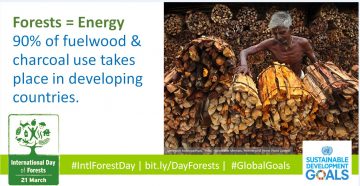Today, more than 2 billion people, in rural and urban areas, still rely on wood fuel to meet their primary energy needs such as cooking and heating. Wood based energy accounts for 27 per cent of the total primary energy supply in Africa, 13 per cent in Latin America and the Caribbean and 5 percent in Asia and Oceania, according to FAO estimates.
Forests cover 30 per cent of the Earth¡¯s land area, yet they continue to be under threat from unsustainable use, environmental degradation, rapid urbanization, population growth, and the impacts of climate change. Between 2010 and 2015, global forest area saw a net decrease of 3.3 million hectares per year.
¡°This is an area where we can make a real difference,¡± said Wu Hongbo, 51³Ô¹Ï Under-Secretary-General for Economic and Social Affairs. ¡°Sustainably managed forests are productive and resilient ecosystems. They provide people with livelihoods and renewable energy, along with timber, food, shelter, clean air, water and climate benefits. Promoting sustainable forest management can help us achieve the Sustainable Development Goals faster.¡±
 Regions with the greatest incidence of poverty, most notably in Sub-Saharan Africa and low income households in Asia, are also the most dependent on fuelwood: ¡°Nearly 90 per cent of all fuelwood and charcoal use takes place in developing countries, where forests are often the only energy source available to the rural poor,¡± said Manoel Sobral Filho, Director of the UN Forum on Forests Secretariat in UN DESA.
Regions with the greatest incidence of poverty, most notably in Sub-Saharan Africa and low income households in Asia, are also the most dependent on fuelwood: ¡°Nearly 90 per cent of all fuelwood and charcoal use takes place in developing countries, where forests are often the only energy source available to the rural poor,¡± said Manoel Sobral Filho, Director of the UN Forum on Forests Secretariat in UN DESA.¡°In order to meet this essential need for renewable energy, now and in the future, we need to galvanize efforts to increase the area of sustainable managed forests in these countries,¡± he added.
Earlier this year, the UN Forum on Forests reached agreement on a UN Strategic Plan for Forests that includes a target to expand global forest area by 3 per cent by 2030, an area of 120 million hectares, about the size of South Africa; as well as a target to eradicate extreme poverty for all forest dependent people by 2030.
Developing countries are not the only ones using forests for energy. Bioenergy from forest biomass (in various forms, including pellets and wood processing waste) accounts for about half of Europe¡¯s renewable-energy consumption. Countries across Europe are converting their power plants from using only coal to a mix of coal and wood products to meet renewable ¡°carbon neutral¡± energy goals. It is estimated that about 90 million people in Europe and North America now use wood energy as their main source of domestic heating.
Ongoing efforts in improving cook stoves, and technological advancements in increasing energy efficiency and production of biomass energy, along with growing concerns over reducing fossil fuel dependence, make it increasingly likely that biomass energy from forests will continue to be a source of renewable energy in the future.
The annual celebration of the International Day of Forests raises awareness of the importance of forests and trees, and serves as a platform to highlight challenges and solutions related to sustainable forest management, from around the world.
Source: UN Press Release

